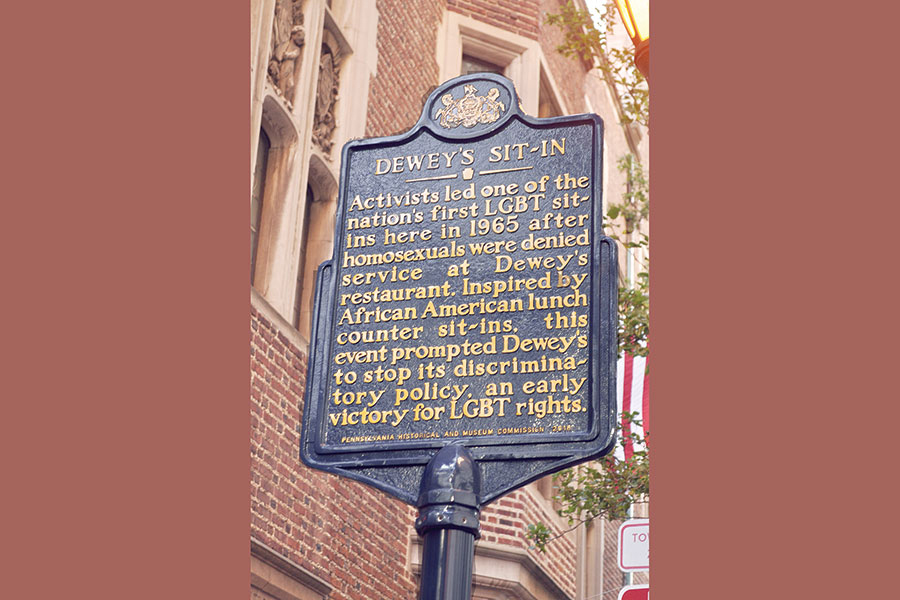Seven months after the Pennsylvania Historical and Museum Commission became the owner of an LGBTQ-oriented historic marker installed near Rittenhouse Square, it remains to be seen whether its language will be revised to recognize contributions of the the early transgender community. Revisions may hinge on whether the city elects its first openly-trans City Council member in November.
The marker, dedicated last fall, commemorates a 1965 LGBTQ sit-in at Dewey’s, a restaurant that was located at 219 S. 17th St. The restaurant has since been demolished and a Hyatt Hotel stands at the site. The marker was sponsored and funded by Equality Forum, a Philadelphia-based LGBTQ advocacy group.
The text of the marker states: “Activists led one of the nation’s first LGBT sit-ins here in 1965 after homosexuals were denied service at Dewey’s restaurant. Inspired by African-American lunch-counter sit-ins, this event prompted Dewey’s to stop its discriminatory policy, an early victory for LGBT rights.”
Deja Alvarez, the city’s first openly-trans candidate for City Council, says the marker’s language should be replaced because gender-variant individuals — not “homosexuals” — were the target of Dewey’s exclusionary policy and led the subsequent protests. She pledged to introduce a resolution calling for replacement language, if elected to City Council in November.
“Absolutely, I will do a resolution to correct the Dewey’s marker [if elected],” Alvarez told PGN this week. “History is important. But our [trans] history continues to be denied and erased. If we’re going to preserve history, it has to be the correct version of history. We can’t have cisgender people rewriting trans people out of history.”
Alvarez emphasized the importance of historical accuracy. “In a city that is so rich with history, making sure the Dewey’s Sit-In story is told correctly is important,” she reiterated.
On Dec. 14, 2017, City Council adopted a resolution calling for the installation of a historical marker commemorating the Dewey’s Sit-In. However, the resolution didn’t specify language for the marker.
Alvarez believes the council would be receptive to another resolution calling for replacement language. “I think they would be open to hearing the reason why it needs to be corrected,” she said. “I think they would be open to understanding.”
Howard Pollman, a PHMC spokesperson, said it would cost about $1,350 to have the marker replaced. Historic markers typically cost about $1,600, Pollman said, but a pole for the marker has already been installed, reducing the cost.
Alvarez pledged to spearhead a fundraising effort to pay for a new marker, if elected. “We’ll figure out a way to raise the necessary funds to correct it,” she said.
Alvarez also said she’ll organize a committee composed of trans people and the broader LGBTQ community to formulate the replacement language. “It just can’t be my voice or my decision alone,” she said. “It has to be larger than that.”
Bob Skiba, a local historian and the archivist at William Way LGBT Community Center, told PGN he would serve on a committee formed by Alvarez. “I’d be happy to [serve on a committee], especially if Deja is taking the lead,” Skiba said, in an April 26 email. “I thought it was important that a trans person spearhead this.”
Pollman said the marker’s current language was a collaborative effort between Equality Forum and PHMC staff. He said PHMC’s historic-marker program has existed for about 70 years and “very few” markers have been replaced.
Todd Snovel, executive director of the Pennsylvania Commission on LGBTQ Affairs, said the group has discussed the Dewey’s Sit-In marker with PHMC.
“Our commission did engage with the Pennsylvania Historic and Museum Commission last fall after the concerns were expressed, to gain a better sense for how nominations for historic markers were submitted and vetted,” Snovel wrote, in an April 26 email. “After learning about the process, we also reached out to the leadership of Equality Forum, the organization who sponsored the nomination and provided language for the marker, to make them aware of the concerns relayed through PGN. We would recommend reaching out to Equality Forum to see if they have made a decision regarding moving forward with altering the language of the marker.”
Malcolm Lazin, executive director of Equality Forum, couldn’t be reached for comment.
Pollman said permission from Equality Forum for a replacement marker wouldn’t be needed, because PHMC owns the marker. “Once a marker is fabricated and installed it becomes the property of PHMC who maintains the marker in perpetuity,” he explained.

